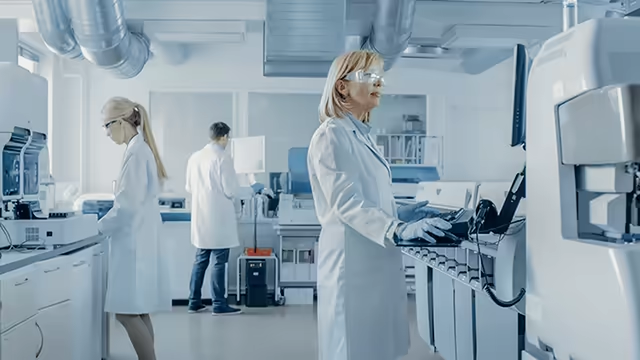For most startups, co-working spaces present an opportunity for growth because they serve as a more practical alternative to building and maintaining proprietary company facilities. It’s clear that coworking spaces are becoming increasingly favoured by many early-stage companies, and the scientific community has certainly not been the last to notice. Today, startups in industries such as biotechnology and biopharmaceuticals have the option to rent a cost-effective shared laboratory space to do their research and development (R&D) work, with added benefits such as high-quality equipment and networking opportunities.
From the outset, it’s easy to see why shared lab spaces appeal to professionals who work in the scientific disciplines. They combine the technical specifications of traditional labs with the open, relaxed vibe of co-working spaces. Such a unique setup has plenty of benefits of its own, a lot of which might entice new researchers as well as senior scientists seeking R&D opportunities outside traditional lab arrangements.
To illustrate further, here are a few reasons researchers, science-driven startups, and industry experts are touting shared lab spaces as the innovative workplaces of tomorrow:
Cost Savings
Co-working laboratories can help researchers save on rent and real estate costs in several ways. Firstly, by sharing lab space, researchers can avoid the cost of renting or building a dedicated lab. This is particularly beneficial for smaller research teams, or those with limited financial resources or have few significant backers or investors. Co-working labs also offer flexible rental arrangements, allowing researchers to rent lab space on a short-term or as-needed basis, which can save costs compared to a long-term lease.
Additionally, co-working labs often provide shared resources, such as utilities, equipment, and consumables, which further reduces the overhead costs associated with operating a lab. In particular, they’ll be able to share chemicals and reagents, which can be expensive to purchase individually.
Indeed, by utilizing a co-working lab, researchers can focus their financial resources on research and development, leading to increased productivity and progress.
Availability of Necessary Equipment, Amenities, and Services
In addition to significant savings on rent, science professionals will also benefit from being able to access a space that’s designed for highly specialised R&D procedures. Typically, shared lab spaces are fitted with electrical systems, plumbing, ventilation, and other infrastructure that can handle hazardous and non-hazardous wastes. Co-working lab spaces with at least Biosafety Level 2 (BSL 2) compliance, for example, are meant to accommodate infectious agents or toxins that present a moderate risk if they are accidentally inhaled, ingested, or come in contact with the skin—items that are often crucial to molecular, cellular, and microbiological research.
Some shared lab spaces may also have additional areas for office-related activities such as meetings and conferences, which startups can maximise to better achieve their project goals. Apart from dedicated desks and furniture, some shared lab spaces also offer common meal areas and hardware such as desktop computers—the latter being a valuable asset for processing important research data.
Other amenities that fully equipped co-working lab spaces may offer are cold storage, centrifuges, water baths, incubators, and autoclaves, among others. These facilities also tend to offer additional services for upkeep, including hazardous waste removal, 24/7 security, and regular equipment maintenance. For the most part, having access to these services gives science startups and their researchers the peace of mind to continue with their R&D work and meet schedules as intended.
More Opportunities for Collaboration
One of the key benefits of an open working environment is having access to other industry colleagues sharing the space. Through a common environment, researchers can experience a collaborative atmosphere where professionals in the scientific disciplines can exchange ideas, share discoveries, and explore opportunities for collaboration.
Thanks to this kind of innovative atmosphere, researchers are given the chance to expand their contacts and network in order to identify more avenues to make groundbreaking scientific discoveries.
Access to Specialised Industry Assistance
On the subject of external contacts, it’s also worth noting that co-working spaces serve as great avenues to get assistance on industry-related matters. This assistance can include anything from licensing businesses and securing permits to connecting with suppliers of lab resources. In biotech, intellectual property (IP) is considered to be an important aspect of R&D since it offers great potential for commercial success or government funding.
Avenues such as programs offered by shared lab spaces allow researchers to get quality assistance on IP-related matters, particularly when it comes to patents and their associated costs. Aside from acquiring this knowledge from industry colleagues sharing the space, researchers may also secure assistance from the co-working lab space organisation itself if the latter offers guidance on matters such as research support, mentorship, financing, and the like.
Related: What Are The Average Costs Of Renting An Office Space?
Final Words: How Shared Lab Spaces Offer Flexibility for Cutting-Edge Research
Similar to how co-working spaces have transformed the way freelancers, remote workers, and small businesses collaborate, shared lab spaces have unlocked for members of the scientific community more flexible ways to pursue innovative endeavors. Apart from providing greater access to amenities and facilities that limited resources may not cover, shared lab spaces also allow professionals of all levels of seniority to collaborate with a diverse set of like-minded experts.
With this freedom to pursue research through innovations like shared lab spaces, members of the scientific community can be flexible enough to bring technological advancement closer to the horizon—and, ultimately, contribute more towards improving the quality of life for more people.



